A new play by Wabanaki REACH and Threadbare Theatre Workshop moves stories of the Maine Indian Land Claims from the head to the heart
As part of the Beyond the Claims— Stories from the Land & the Heart project, Wabanaki REACH, a nonprofit that supports the self-determination of Wabanaki people through education, truth-telling, restorative justice and restorative practices in Wabanaki and Maine communities, recorded more than 40 oral history interviews in 2022. The conversations focused on the interviewees and their life stories, especially as they relate to the fraught history and ongoing impacts of the Maine Indian Land Claims, the Maine Indian Claims Settlement Act (MICSA), and the Maine Implementing Act.
Through MICSA, the Passamaquoddy Nation and Penobscot Nation received $81.5 million in reparations for the 12 million acres (or nearly two-thirds of what is now called Maine) that were stolen from them. One of the many troubling aspects of this legislation is the stipulation that federal laws enacted after the 1980 settlement for the benefit of Indians do not apply in the state of Maine, impairing Wabanaki Tribes’ ability to exercise the same sovereignty in their territory as other federally recognized tribes. As the Wabanaki Alliance has written, “The Penobscot Nation has both the sovereign status of a federally recognized Indian tribe and the subordinate status of municipality under Maine law.”
The act of telling and recording stories that document the complex implications of this legislation was and continues to be a powerful practice for Wabanaki REACH and the community members involved — Wabanaki REACH is in the process of building an interview archive so that these stories can be available as a resource. Yet as Wabanaki REACH Beyond the Claims Project Coordinator and Threadbare Theatre Workshop Director and Co-Facilitator Kate Russell, says, “Not everyone is going to log into an archive and listen to a three-hour interview to learn more about land claims.” Thus, the idea for, “panawáhpskek – where the river widens,” a new play by, for and with Wabanaki people, began — the first educational resource to come out of the Beyond the Claims initiative.
In partnership with Blue Hill-based Threadbare Theatre Workshop, the play’s performers and creators met twice a week over the summer, using community-devised theater methods such as sharing stories, improvisation and play, as well as listening to some of the interviews collected, to create the play — from scratch. While some of the cast live on Penobscot Indian Island Reservation — where the play was performed — others traveled from Bangor, Deer Isle, Old Town, Orono, Portland and Sedgwick to collaborate. Most rehearsals, as well as the play itself, took place alongside the Penobscot River, a being that many cast members referred to as an ever-present co-collaborator and guiding force.
Between the dress rehearsal, a performance for the tribal community and a public performance, the play was performed three times in September of 2023.
“We’ve already got a lot out of it, from the process,” says Esther Anne, a cast member and policy associate at the University of Southern Maine Cutler Institute. “Of course, we want to do well. I don’t want to make any mistakes but we really can’t mess it up. Because we’ve been coming together in this way, the laughs we’ve shared, helping each other through things. We’re creating community again and that’s priceless. And in a sense, we can’t mess it up, either. It’s not like we’re doing a play everybody knows. We’re not doing the Nutcracker!”
When I sat down to write about the play, I kept returning to what George Loring shared with me during a pre-dress rehearsal interview. Rather than describing the play and its impact from my perspective, as a white journalist, I was moved to ask Loring if we could include his words.
What follows is an account of “where the river widens” from the perspective of
Loring, who provided music direction for the play, and also played the parts of Gluskabe, the land, the birds, the sun, a moose, and a Penobscot tribesperson (which he is also in real life, as well as a musician and helper of people with physical and mental disabilities). The interview has been condensed for length and clarity.
-Michele Christle
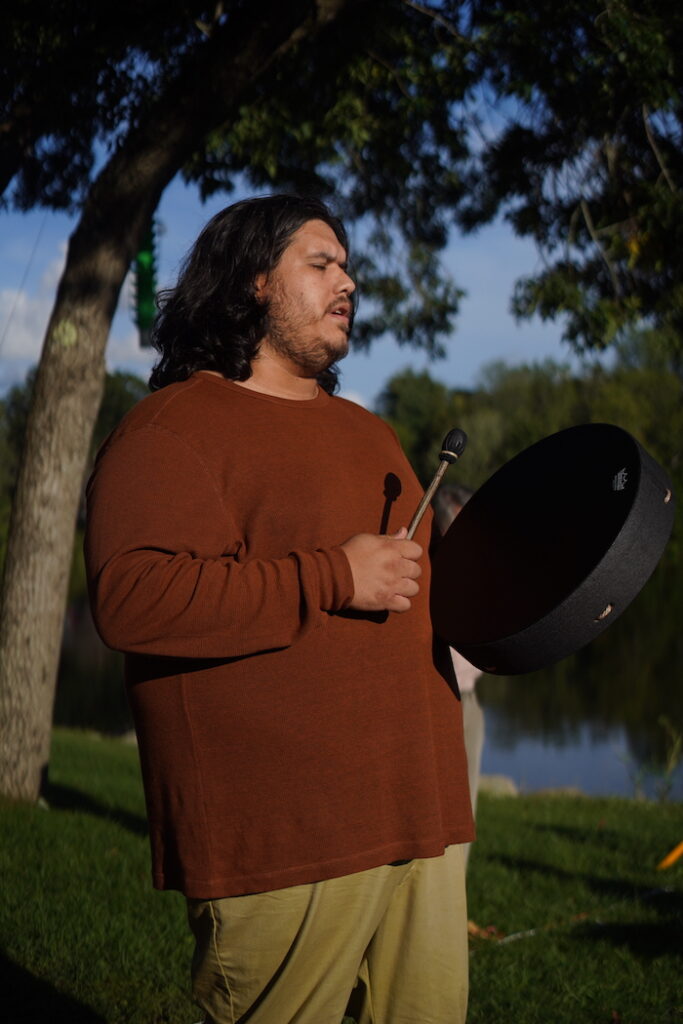
We’re all standing in the audience. We are a part of the people. In this moment, everything’s new to us as well. Then, the wheels start turning. I pick up a drum and start playing, drumming and singing the honor song, which was traditionally in Mi’kmaq. I’m singing it in Penobscot, which is cool for me because I am Penobscot and I can kind of understand it more and project the feeling of the song. After that’s done, we gather. We all take our places to become the land. We are the hillside. We are one with the land. We do a bird song, emulating the birds flying over the land, over your chairs. Then I break off from the land. Everybody else is still in formation. I come up as the sun. I’m doing this sun dance, shining a light on the land as it breaks apart and becomes other aspects. One side becoming sweetgrass, doing a grass dance and on the other side, Mount Katahdin is forming, coming to its peaks as I, the sun, shed light on all of it. I embrace the side of the mountain and then I shed the land off as the play begins.
I continue my sun dance into the center stage where I transform into moose. I get to do my thing and strut my stuff, walk down the center. From there, I transform into Gluskabe. Gluskabe is a deity in his own right, a cultural hero. Growing up I always heard him like considered to be the Indigenous Jesus, you know, like he’s the chosen one. He’s the one that brings all the relations.
I shoot the arrow into the trees. Emerging from that are people, the first people. I take my running leap through everybody. They gather around me. We form a line. I capture the sun. I bring it down and pass it along to the people behind me, the generations behind me, as they continue to carry the sun, the energy, the life, from there. I become one of the people, a member of the tribe. I go with Dale, who is playing a fisherman, and we take the canoe on our journey. We drop tribespeople off at their workstations as they continue with tribal life or tribal being.
Eventually, the canoe stops. That’s when we get to the next thing, which is the introduction of foreigners, people we’ve never seen before. It’s something new, it’s scary. At first, it doesn’t quite phase us because we’ve met different people from different tribes. It’s not like it was anything that was completely out of the ordinary. But this time it brings sickness and it brings trading. It brings insecurities. It brings scarcity and it frightens us. So, we become less accepting or more afraid of what’s coming next.
Each scene progresses like this. How we interact with people changes because of the previous people that were interacted with. It’s kind of like jumping through eras. It’s like a time-travel piece.
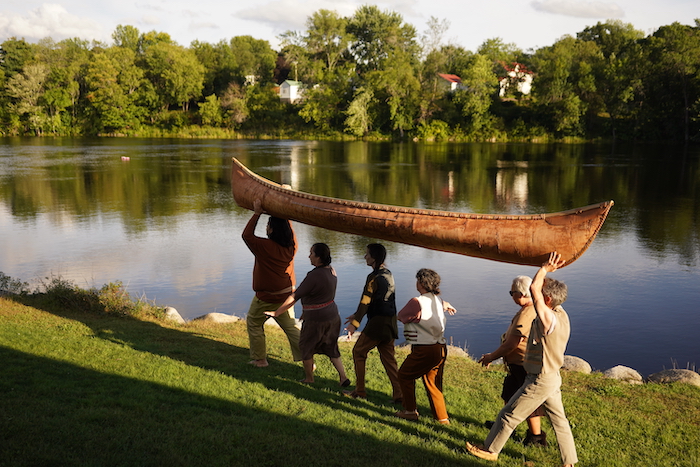
The last scene in the act is where the flag is planted. It’s the idea of a claim that’s not ours — a claim that’s taken away. We don’t know how to accept it. We don’t know how to react to it. But in that moment, it changes the lives of the tribespeople forever. In that moment, the “portal” opens and we get to break the fourth wall. We get to see the audience. We see what’s on the other side. It’s scary. It’s infinite possibilities. One of the tribespeople goes through and gets lost amongst the ethereal plane.
We get scared into another transition. The dialogue in this scene came from a rehearsal session where we all sat by the River telling stories about what we learned growing up, about atrocities and shady behavior that was masked by niceties, like the foreigners offering us a plate of peas. Maria says, “The men loved the peas so much they would bring them back to share with the rest of the tribe.” The peas symbolize the way an already weary people were lulled into a false sense of security. They were placated so that when items, people and eventually places were taken away, they wouldn’t notice right away. There’s a lot of dialogue between the tribal members who notice these changes and the people who are missing.
We break off, we do the whole cattails thing. We’re all still tribespeople at this point. But we’re being catapulted forward in time. As each scene happens, we’re progressing further into colonization and the world that we’re living in now.
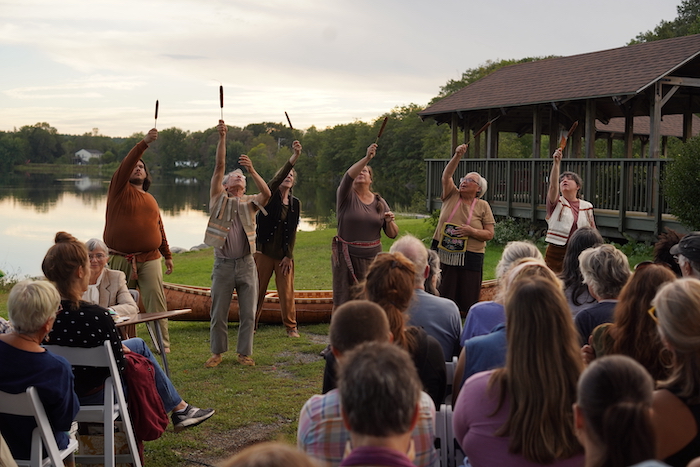
Eventually, we all go through the portal. Now we’re standing amongst the people of the land. We take a moment to breathe it in. There are other things that happen that I’m skipping over. Like, we sing the “O Holy Night” in Passamaquoddy, in front of the church, in front of the portal, in front of the world.
We’re at the land claims meeting at this point, interacting with our scene partners. After all is said and done, we take our places amongst the audience again and take up our roles as members of the Land Claims Act at the actual court hearing.
We are reciting actual lines that were captured during the Maine Land Claims Settlement Act. It’s just such a powerful piece. That’s when we get to hear what people were saying, what stances they took, and what it meant to them as individuals but what it meant to us as a tribe as well. We get to see both sides, pros and cons. It becomes sort of a cacophonous scene. It gets a little overwhelming at times trying to hear everybody’s point of view but that’s kind of how it was. Everything was happening so fast and there was not enough time to prepare for it. So much information was dumped on us all at once. So many people had so much to say, but they weren’t given enough time to say it.
You have the character of Bonnie Post, the mediator, played by Margo Lukens, trying to keep everyone in line but treating people differently, not giving certain people the X amount of time to speak. They are interrupted while they’re speaking, and asked to speak louder, even though they’re already speaking as loud as they can. It’s kind of dehumanizing. They weren’t even allowed to speak the same amount of time as anybody else, you know. And all this is happening, all this is going on, and all of a sudden it just stops.
Then we get to hear it from ssipsis, one of our most powerful speakers and influencers of the time, played by Andrea Francis. ssipsis was very powerful — so much power coming from such a small woman. She was an inspiration to a lot of people coming up. She was a grandmother to one of my closest friends growing up. I got the chance to meet her during the final stages of her life.
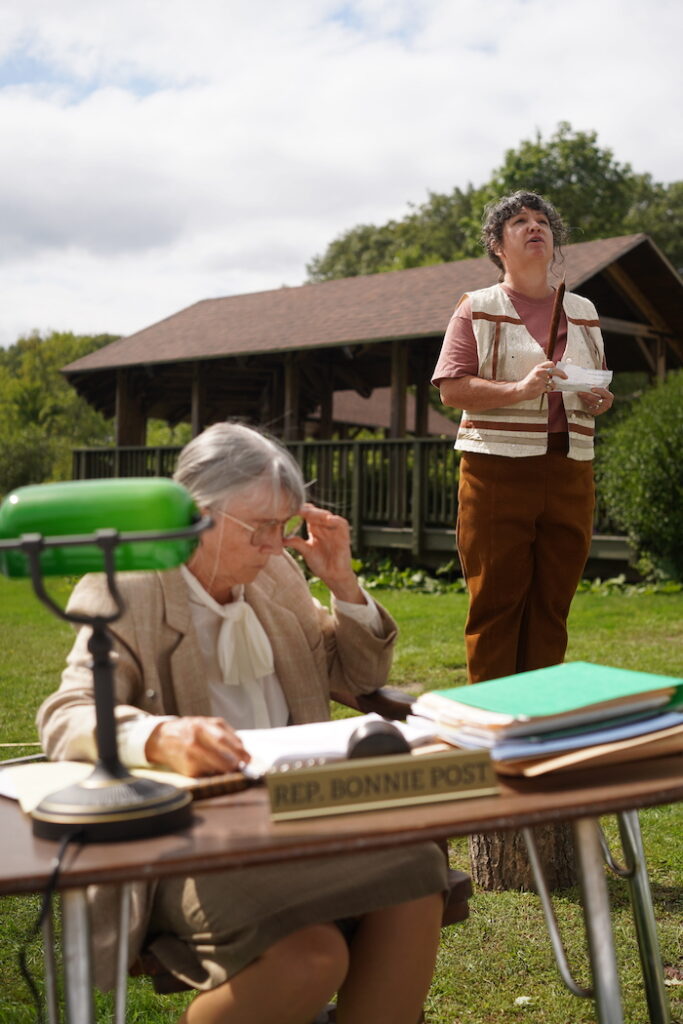
The way is cleared for ssipsis to stand up and speak, but they try to stifle her. She’s like, “I’m gonna say what I need to say and it’s going to be heard.” That’s probably one of my favorite parts of the play, ssipsis becoming this major figurehead, seeing that happen and having in my vision, the person I knew growing up, having that sort of power and influence called back during the play to be relived.
So, we went through all these eras of time from creation all the way to 1980s Land Claims to now. We push forward and it’s like what’s next? What happens after this?
We’ve got a beautiful scene with Nick Bear and his daughter, played by Ellie Hildreth. They have a nice father-to-daughter moment. I always call it the “will of fire” but that’s just kind of the poetic nerd in me — what I mean is keeping the fire alive for the next generation.
Nick calls out the moon to his daughter, kkihkayí-kisohs (moon of planting and sowing). That’s another thing — we encapsulate all these different seasons through the moon in different parts of the play. The daughter asks, “What does that mean?” He’s very gracefully giving her an explanation about the name of the moon that pretty much summarizes everything in the play. And as he’s educating his daughter about what it really means to push it forward and prepare the next generation to tell stories, give traditional offerings, what it means to be Penobscot or Indigenous or Wabanaki.
Tus, who transcends a lot of these eras and acts as almost a guide towards the audience about what to take from this and what there is to offer, is played by Lilah Akins. She is within the whole time, she’s kind of like an ethereal being in herself. She’s there present in the moment, but she’s kind of fading at this point. And that’s when it comes to the importance of the will of fire. You have to pass it along. You don’t want to let it fade. She goes and gets the land fabric that we use in the beginning scene as the hillside and puts it on. It becomes different landscapes throughout the play. She puts it around herself and she walks away while there’s a recording of Tim Love playing, talking about his childhood, traditional dances and their meaning.
One of the beautiful things about this production is that there are actual snippets of conversation, and recordings of tribal members and tribal leaders that were present during this, during the Land Claims, before and after. They’re all very powerful speeches on their own. They’re played throughout our scenes, throughout our movement, when there’s no dialogue. It fills in a lot of the open spaces. Tim Love’s speech is being run through while Lilah walks away with the land fabric still on her, dragging on the earth. She drapes herself in the land fabric to keep it close, keep it with her, and to keep it going as she moves forward through Nick and his daughter. Then it drapes away. It’s like the end credits scene. It’s a very beautiful moment. It’s kind of hard to explain. This whole thing is really hard to explain.
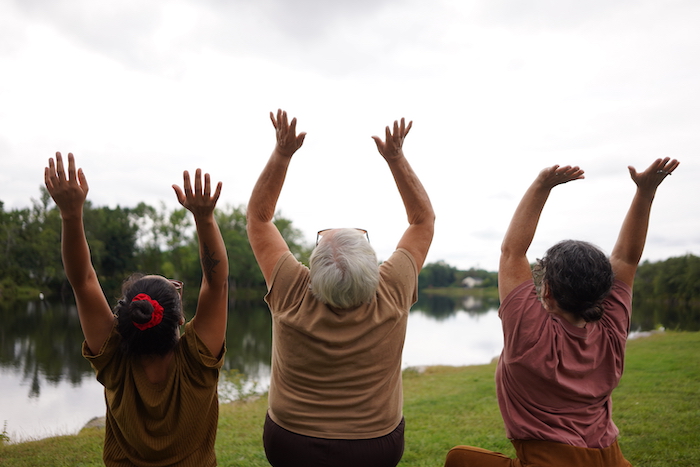
She guides away, towards the River, “where the river widens,” which is a poetic stamp on the title of the play and what the play is about. It’s not just about the River, but it’s about the River as land, included as land. That’s one of the discussions we had during our improv scenes. The River has always been, at least during my growing up, a borderline. A separator, when really it’s not. It’s part of the land. All of it is land. There shouldn’t be any separations, borders, this and that.
In my mind, when I hear “where the river widens,” that’s what I think about. I think about the offshoots, not just from the River to the ocean but to any entrance of a mouth of a body of water. A lot of times, a river is not just two straight parallel lines. A lot of times they open up, go different routes, branch off, all these veins.
In my mind, this is about sharing the story with everybody. This is something that anybody can get behind. We’re trying to make it open for everybody, to bring people in, and to strengthen our own community, by bringing people together.
-George Loring
Related Resources for Learning
- Bomazeen Land Trust — bomazeenlandtrust.org
- Eastern Woodlands Rematriation Collective — facebook.com/ewrematriation
- First Light Learning Journey — firstlightlearningjourney.net
- Landback — landback.org
- Maine Indian Claims Settlement Act of 1980 – Resources for Continued Learning — wabanakireach.org
- Nibezun — nibezun.org
- “Penobscot Language Map – This is How We Name Our Lands” by Penobscot Nation Cultural & Historic Preservation Department — mainehistorystore.com
- Sunlight Media Collective — sunlightmediacollective.org
- Threadbare Theatre Workshop — threadbaretheatreworkshop.org
- Wabanaki Alliance — wabanakialliance.com
- Wabanaki REACH — wabanakireach.org
This article was originally published in the winter 2023-24 issue of The Maine Organic Farmer & Gardener.
